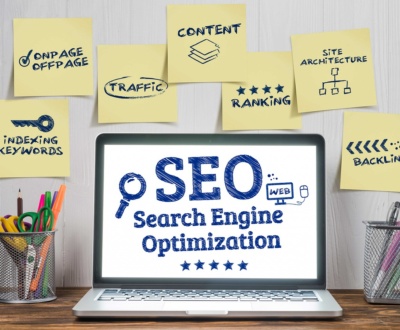In the realm of search engine optimization (SEO), there are three critical pillars that shape the visibility and performance of a website: on-page SEO, off-page SEO, and technical SEO. Each pillar plays a distinct role in optimizing a website for search engines, but they are often misunderstood or underutilized. Understanding the differences and benefits of these three SEO strategies is crucial for unlocking the full potential of a website’s online presence.
From optimizing content and keywords to building backlinks and ensuring website functionality, this comprehensive guide will delve into the intricacies of on-page SEO, off-page SEO, and technical SEO, empowering you to make informed decisions and propel your website’s success in the digital landscape.
What Is On-Page SEO?
On-page SEO refers to the practice of optimizing individual web pages to improve their visibility and ranking in search engine results. It involves making strategic adjustments and optimizations directly on the website itself, focusing on factors that search engines consider when determining the relevance and quality of a page.
On-page SEO encompasses various elements, including optimizing meta tags (title, description), creating high-quality and keyword-rich content, improving page load speed, optimizing URL structures, using proper heading tags, incorporating relevant internal and external links, and ensuring mobile-friendliness and user-friendly navigation. The goal of on-page SEO is to enhance the user experience, provide valuable and relevant information to visitors, and make it easier for search engines to understand and index the content, ultimately improving the website’s organic search rankings and driving targeted organic traffic.
What are the On-Page SEO Elements?
On-page SEO involves optimizing several key elements on a web page to improve its search engine visibility. Here are some essential on-page SEO elements:
Title Tag
The title tag is a concise and descriptive HTML element that appears as the clickable headline in search engine results. It should include relevant keywords and accurately summarize the content of the page.
Meta Description
The meta description is a brief summary of the page’s content that appears below the title tag in search results. It should be compelling, informative, and include relevant keywords to entice users to click on the link.
Heading Tags
Heading tags (H1, H2, H3, etc.) are used to structure the content hierarchy on a page. The H1 tag should include the primary keyword and provide a clear heading, while subsequent heading tags can be used to organize subheadings and sections.
URL Structure
A clean and descriptive URL helps both search engines and users understand the page’s content. It should be concise, relevant, and include the target keyword if possible.
Keyword Optimization
Incorporating relevant keywords naturally throughout the content is important for search engine relevance. However, keyword stuffing should be avoided, as it can negatively impact user experience and search rankings.
Content Quality
High-quality, valuable, and unique content is essential for on-page SEO. It should be well-written, engaging, and address the user’s search intent. Including multimedia elements such as images and videos can enhance the user experience.
Internal and External Links
Including relevant internal links to other pages on the website helps search engines navigate and understand the site’s structure. External links to reputable and authoritative sources can provide additional context and credibility to the content.
Image Optimization
Optimizing images by using descriptive file names, alt tags, and compressed file sizes improves page load speed and helps search engines understand the content of the images.
User Experience
A user-friendly website with easy navigation, fast page load speed, mobile responsiveness, and clear calls-to-action enhances the user experience. Search engines prioritize websites that provide a positive user experience.
What Is Off-Page SEO?
Off-page SEO refers to the activities and strategies implemented outside of a website to improve its search engine rankings and visibility. Unlike on-page SEO that focuses on optimizing elements within the website, off-page SEO revolves around building a strong online reputation, increasing website authority, and acquiring relevant backlinks from other websites. Off-page SEO is primarily concerned with demonstrating to search engines that a website is trustworthy, authoritative, and deserving of higher rankings.
What are the Off-Page SEO Elements?
Link Building
Building high-quality backlinks from reputable and relevant websites is crucial for off-page SEO. These backlinks serve as “votes of confidence” that signal to search engines the website’s credibility and relevance. Engaging in guest blogging, influencer outreach, and creating shareable content are common link building tactics.
Social Media Marketing
Establishing a strong presence on social media platforms can contribute to off-page SEO. By sharing valuable content, engaging with followers, and building a community, a website can increase brand awareness, attract more visitors, and potentially earn social signals that impact search engine rankings.
Online Reputation Management
Maintaining a positive online reputation is vital for off-page SEO. This involves monitoring and managing online reviews, responding to customer feedback, and actively engaging in online discussions and communities related to the industry. A strong reputation builds trust and credibility, positively impacting search rankings.
Brand Mentions and Citations
Getting mentioned and cited by other websites, even without a direct link, can still contribute to off-page SEO. Brand mentions and citations signal to search engines the authority and relevance of a website within its industry.
Influencer Marketing
Collaborating with influencers or industry experts can help increase brand visibility, expand the reach of content, and attract more backlinks and social signals.
Online Directories and Listings
Submitting the website to relevant online directories and listings can improve visibility and generate potential backlinks. However, it is important to focus on reputable directories and avoid spammy or low-quality ones.
What is Technical SEO?
Technical SEO refers to the optimization of the technical aspects of a website to improve its search engine visibility and crawling efficiency. It involves ensuring that a website’s technical foundation is solid, allowing search engines to access, crawl, and index its content effectively. Technical SEO focuses on optimizing the website’s infrastructure, code, and server configurations to enhance its performance and make it easier for search engines to understand and rank the site.
What are the Technical SEO Elements?
Website Speed and Performance
Optimizing the website’s loading speed is crucial for both user experience and search engine rankings. This involves compressing images, minifying CSS and JavaScript files, utilizing browser caching, and optimizing server response times.
Mobile-Friendliness
With the increasing use of mobile devices, having a mobile-friendly website is essential. Responsive design, mobile-friendly layouts, and fast-loading pages on mobile devices are important factors for search engine rankings.
Website Crawling and Indexing
Ensuring that search engine crawlers can access and navigate the website efficiently is a fundamental aspect of technical SEO. This includes creating and submitting an XML sitemap, using robots.txt files to control crawler access, and addressing any crawl errors or broken links.
URL Structure and Site Architecture
Having a logical and well-organized URL structure helps search engines understand the website’s content hierarchy. Implementing proper internal linking and a clear site architecture facilitates navigation for both users and search engine crawlers.
Schema Markup
Implementing structured data markup, such as Schema.org, helps search engines better understand and interpret the content on a website. This can enhance the visibility of rich snippets in search results, providing additional context and information to users.
Canonicalization and Duplicate Content
Canonical tags are used to indicate the preferred version of a web page when there are multiple versions of the same content. Resolving duplicate content issues through canonicalization helps search engines avoid indexing duplicate pages and improves the website’s overall SEO.
SSL/HTTPS
implementing SSL (Secure Sockets Layer) and using HTTPS encryption is not only important for securing user data but also for SEO. Search engines favor secure websites and may rank them higher in search results.
Website Structure and Navigation
A well-structured website with clear navigation helps users and search engines easily find and access content. This includes logical page hierarchy, breadcrumb navigation, and user-friendly menus.
Why Do You Need These Different SEO Strategies?
Implementing different SEO strategies, including on-page SEO, off-page SEO, and technical SEO, is essential for achieving optimal search engine visibility and driving organic traffic to a website. Here’s why you need these different SEO strategies:
Comprehensive Optimization
Each SEO strategy focuses on different aspects of website optimization. On-page SEO ensures that your website’s individual pages are optimized for search engines, including relevant keywords, high-quality content, and user-friendly elements. Off-page SEO helps build your website’s authority and reputation through link building, social media marketing, and online mentions. Technical SEO ensures that your website’s technical foundation is solid, allowing search engines to access and understand your content effectively. By combining these strategies, you can achieve a holistic and comprehensive optimization approach.
Ranking Factors
Search engines consider a variety of factors when determining search rankings. On-page SEO helps search engines understand the relevance and quality of your content, while off-page SEO signals your website’s authority and popularity. Technical SEO ensures that your website is technically sound, making it easier for search engines to crawl, index, and rank your pages. By addressing these different ranking factors, you increase your chances of appearing higher in search results.
User Experience
All three SEO strategies contribute to providing a positive user experience. On-page SEO ensures that your content is valuable, relevant, and easy to navigate, making it enjoyable for users to consume. Off-page SEO builds your online reputation and presence, making it easier for users to find and trust your website. Technical SEO ensures that your website is fast, mobile-friendly, and user-friendly, enhancing the overall user experience. By focusing on these strategies, you improve user satisfaction, which can lead to increased engagement, longer time on site, and repeat visits.
Long-Term Success
SEO is an ongoing process that requires continuous optimization and adaptation. By implementing a diverse range of strategies, you create a solid foundation for long-term success. On-page SEO helps you create valuable and optimized content that stands the test of time. Off-page SEO builds relationships, increases brand visibility, and generates sustainable traffic through quality backlinks. Technical SEO ensures that your website remains technically sound and optimized for future algorithm updates. By combining these strategies, you establish a sustainable SEO approach that can withstand changes in search engine algorithms.
Conclusion
In conclusion, On-Page SEO, Off-Page SEO, and Technical SEO are three distinct yet interconnected aspects of search engine optimization that collectively contribute to a website’s visibility and ranking in search engine results. On-Page SEO focuses on optimizing individual web pages through relevant content, proper keyword usage, meta tags, and user-friendly design, ensuring a positive user experience. Off-Page SEO involves building quality backlinks, social media promotion, and online reputation management to establish the website’s authority and credibility. Technical SEO deals with optimizing website structure, page speed, mobile-friendliness, and other technical factors that impact search engine indexing and crawling. A comprehensive SEO strategy should incorporate all three components to achieve the best possible search engine visibility, organic traffic, and ultimately, online success.
Built To Last is a London SEO agency where we provide local SEO marketing services. We have an expert team of SEO consultants, content writers, link builders, technical SEO specialists, local SEO gurus, and Google analytics masters to take your business from better to best.
About this SEO blog
We are a SEO marketing company with a focus on helping our customers achieve exceptional results by offering them top Google rankings.
Request a free quote
We offer professional SEO services that help websites increase their organic search score drastically in order to compete for the highest rankings even when it comes to highly competitive keywords.
Subscribe to our newsletter!
More from our blog
See all postsRecent Posts
- Types of Customers in Marketing: Understanding Your Audience May 15, 2024
- Business to Customer Marketing: The Ultimate Guide May 15, 2024
- Blackhat SEO Techniques To Avoid May 14, 2024









